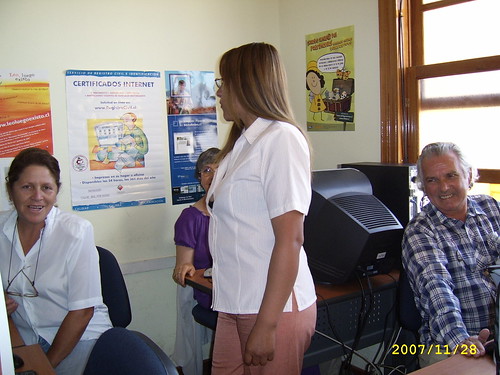Back in March last year I pointed to Contenidos Locales (“Local Content”), a program of Chile's national library network, as a model example of how public institutions like libraries can foster more civic participation by training their local users how to take advantage of new media tools.
Digital literacy class at Biblioteca Pica
Examples include Buscando Mis Raices (“Looking for my Roots”) by Rosa Tromilén, which offers a personal history of the Mapuche-majority community Juan Calfumán; Conjunto Folklórico Renacer de Cucao, a youth-group on Chiloé Island dedicated to preserving local folkloric traditions; and the website of the Asociación de Artistas Plásticos de Puerto Montt (“Association of Plastic Artists of Puerto Montt”).
At last year's annual meeting of Chilean librarians coordinator Enzo Abbagliati promised those gathered that by the end of 2009 all Chilean libraries, from the southern tip of Patagonia to the northern border with Bolivia, will be equipped with free wireless internet access. He also insisted that the digital literacy training classes and the “Local Content” website would be updated to reflect the connected nature of the modern web.
At this year's annual meeting, which is taking place as I type, Chile's librarians received an exciting announcement which is sure to make Enzo's previous promises reality. As the press release reads, “thanks to the third donation of the Bill & Melinda Gates Foundation, BiblioRedes will tackle the challenge of increasing web 2.0 social participation.”
Este proyecto se concretará en el contexto del actual plan estratégico de BIblioRedes, que llega hasta diciembre de 2010 y que llevará a cabo entre otras, las siguientes tareas: mejoramiento de la conectividad de las Bibliotecas Públicas con el fin de facilitar el acceso a las aplicaciones de la web social y los servicios digitales bibliotecarios; aumento en el desarrollo de las competencias, tanto en el personal como en los usuarios de las Bibliotecas Públicas, -necesarios para participar en esta nueva web- , y el aumento de la oferta de contenidos y servicios digitales asociados a las Bibliotecas Públicas, para una mayor participación de los usuarios en la denominada web 2.0.
In his personal blog Enzo Abbagliati provides more context about the program.
¿En qué invertiremos los recursos de la Fundación Gates? Primero, en aumentar el ancho de banda de las bibliotecas, buscando llevar el piso a 1 Mb. Para promover la inclusión en la web social, hay que dar el ancho. Por otro lado, proyectar el modelo de desarrollo de competencias del personal de las bibliotecas y de nuestros usuarios, fortaleciendo una línea que ya iniciamos el año pasado en torno al e-learning y el desarrollo de habilidades para el trabajo colaborativo. Para promover la inclusión en la web social, tenemos que cambiar(nos) el switch.
Y, por último, reformular de manera completa la identidad y plataforma de servicios virtuales de BiblioRedes. Sí, nuestra presencia en la Web sigue siendo muy 1.0, pero a contar de marzo o abril, empezarán a estar disponibles nuevos servicios virtuales del Programa, pero sobre todo una nueva filosofía en la relación con nuestros usuarios. No doy mayores noticias al respecto, porque esta transformación es parte de uno de nuestros “secretos de Estado”, pero tenemos claro el foco: para promover la inclusión en la web social, hay que saber conversar.
Moreover, we will finish developing the training curriculum for our library staff and our users, fortifying the work that began last year around e-learning and collaborative working. To promote inclusion on the social web, we have to change [how we work].
And finally, a comprehensive reformulation of the BiblioRedes’ online identity and service platform. Yes, our presence on the Web is still very “1.0”, but beginning in March or April, we will make available not only a new virtual services program, but also a new philosophy regarding our relationship with our users. To promote social inclusion on the Web, we need to know how to talk.
BiblioRedes continues to be a model for national public institutions wanting to use citizen media tools to redefine their relationship with users.




